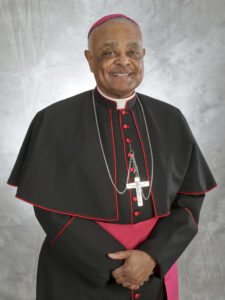
by Tablet Staff
WINDSOR TERRACE – The shocking killing of a black man in Georgia by two white men has drawn the attention of one of the most prominent Catholic leaders in the U.S.
Archbishop Wilton Gregory, of Washington, D.C., issued a statement on May 13 condemning the killing of Ahmaud Arbery in strong terms, calling the deadly incident a “murderous attack” which serves as a grim reminder that racism is a destructive virus in the U.S.
“Currently, our attention is fixated on the global deadly virus. Desperately, we search for a vaccine to combat the coronavirus pandemic. Daily, we pray for the dead, those who have lost loved ones and first responders caring for our sick,” Archbishop Gregory said in his statement. “The recent brutal killing of Ahmaud Arbery in the state of Georgia reminds us of another virus that is much older, but just as deadly. The virus of racism inflicts hatred, violence, and death in our society and in the lives of far too many people.”
Gregory is the first prelate to speak out publicly on the Arbery case.
“In the Georgia case of Ahmaud Arbery, once again, an unarmed black man has had his life violently cut short,” said Archbishop Gregory, who also wrote about the fatal incident in the Catholic Standard, the newspaper of the Archdiocese of Washington D.C. “This murderous attack, like all acts of racism, hurts all of us in the Body of Christ since we are all made in the image and likeness of God, and deserve the dignity that comes with that existence.”
Ahmaud Arbery, 25, was shot to death in Brunswick, Georgia, on Feb. 23 by two white men, Gregory McMichael, a 64-year-old former police officer and his 34-year-old son, Travis, according to authorities. The father and son were arrested by the Georgia Bureau of Investigations on May 7 and charged with murder and aggravated assault.
But the criminal charges were filed more than two months after Arbery was killed and only after a video shot by someone at the scene surfaced showing the seconds leading up to the killing. The sounds of shots being fired can be heard on the video.
The McMichaels are citing Georgia’s citizen arrest law as a defense. The law allows citizens to arrest a suspect if they witness the suspect committing an offense or if the citizen has direct knowledge of the offense. Gregory McMichael told authorities that he and his son spotted Arbery running through the neighborhood and believed he was a burglar. The dead man’s family said he often jogged through the neighborhood.
A second video, shot minutes before Arbery was gunned down, shows Arbery stopping by a home under construction, entering the site, and looking around before leaving to resume his jog.
The murder case has sent shockwaves through the entire country and has renewed allegations of racism.
In response to the outcry over the fatal shooting, Georgia’s attorney general is asking for an investigation into possible prosecutorial misconduct. The U.S. Department of Justice is investigating whether the shooting was a hate crime.
Archbishop Gregory, who served as archbishop of Atlanta, Georgia from 2005 to 2019, is a member of the U.S. bishops’ Anti-Racism Task Force. In 2016 was selected to lead the Special Task Force to Promote Peace in our Communities.
In his statement, he also condemned racism against Jews, Muslims, and Christians and called for compassion and mercy.
“We also see racism destroying the lives of Jewish, Muslim, and Christian people because of their religious and ethnic heritages. Racism triggers the divisive and xenophobic attitudes of nationalism,” he said. “We already have the balm that cures racism – compassion, mercy, love, and justice. We must make sure we apply the balm. The prophet Jeremiah reminds us to seek the balm of Gilead and we know from Scripture that the balm is Jesus. Through Jesus, we become more compassionate, merciful, and loving to seek justice for all our neighbors. “
